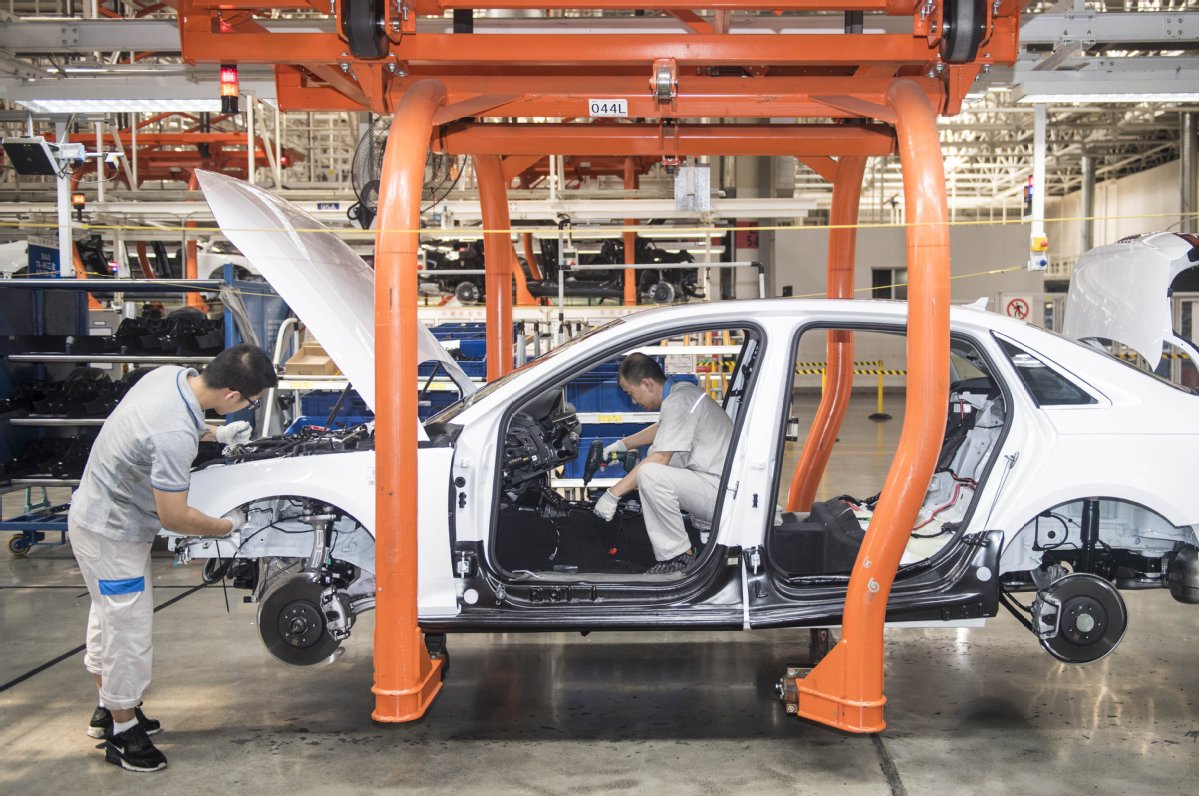China confident of achieving 2019 industrial output target
China is confident of achieving its annual industrial growth target of 5.5% to 6% year-on-year in 2019, as the nation works hard to boost the high-quality development of manufacturing, despite trade friction with the United States, the nation's top industry regulator said on Tuesday.
China is confident of achieving its annual industrial growth target of 5.5% to 6% year-on-year in 2019, as the nation works hard to boost the high-quality development of manufacturing, despite trade friction with the United States, the nation's top industry regulator said on Tuesday.

Front line staff members assemble an automobile at the First Automobile Works in Changchun, Northeast China's Jilin province, July 9, 2019. [Photo/Xinhua]
Xin Guobin, vice minister of industry and information technology, said: "Industrial output rose by 6% in the first half, hitting the upper line of our annual growth target range, signifying stable performance and beating our expectations, given the challenges we face."
From January to June, investment in the technical upgrading of manufacturing went up by 13.1% year-on-year, 10.1 percentage points higher than the growth rate of overall manufacturing investment.
Such strong input indicates a good foundation for future growth and highlights that companies are attaching greater importance to technology-driven growth, Xin said.
According to the ministry, though the trade friction with the US have affected the country's sprawling manufacturing sector, the impacts are controllable. The government has rolled out a string of policies, including tax cuts for semiconductor companies, to cushion the negative effects, and China's trade with the European Union, ASEAN and South Korea all achieved growth in the first half of this year.
Xin said that some companies are shifting their business out of China to Southeast Asian countries where production costs are lower, but the number is very limited and most of such businesses engage in low-end manufacturing.
"There is no need to exaggerate such change. China's huge domestic market, complete industrial system and highly-efficient infrastructure still make the country the most attractive destination for investment," Xin added.
In the first half of this year, China's use of overseas funds in high-tech manufacturing grew 13.4% year-on-year, data from the ministry show.
Qin Hailin, a senior industrial economy researcher at the China Center for Information Industry Development, said China is in the critical stage of industrial restructuring, shifting from fast-growth to high-quality development. An inevitable result of such change is that some low-end businesses will move their plants out of China.
"We found that labor-intensive companies account for most of companies that make such adjustment," Qin said. "Also, as Chinese companies beef up their technological prowess, some of their foreign counterparts lose competence in China and they are also forced out the country."
For instance, South Korean smartphone vendor Samsung has closed some smartphone manufacturing plants in China after it lost market share to Chinese rivals. Such incidents fall short to support sayings that foreign companies are pessimistic about the China market's growth potential, Qin said.
But according to him, close attention must be paid to observe how many and how fast companies are adjusting the geographic layout of their businesses. "After doing surveys and investigations, we found that the impacts are controllable," Qin added.
Taking Guangdong province for example, in 2018, 588 overseas manufacturing companies adjusted their business layout, moving some to Southeast Asia countries, but the number only accounts for 1.44% of the overall overseas-funded manufacturers in the province.
More importantly, during the same time frame, 1,918 new overseas companies invested in Guangdong, and some companies are even bringing back the businesses they have moved out, data from the Guangdong provincial government show.

